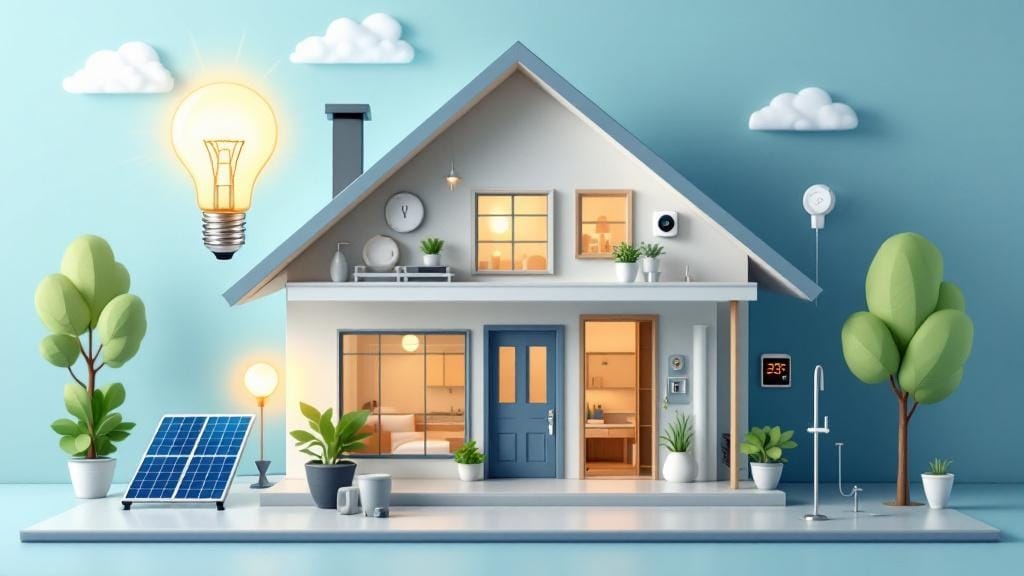In today’s fast-paced world, managing utility costs is more important than ever. Whether you’re trying to reduce your monthly expenses or simply want to make your home more energy-efficient, there are plenty of ways to save money on utilities. From lowering electricity bills to saving on water, every little step you take can have a big impact. In this post, we’ll explore tips for saving money on utilities that are both practical and effective. Let’s dive in!
Why Utility Bills Can Get So High
Before we explore the tips, it’s important to understand why utility bills tend to spike in the first place. Rising energy prices, poor insulation, inefficient appliances, and even outdated heating and cooling systems can all contribute to higher bills. However, by identifying the areas where energy is being wasted, you can make smarter decisions that ultimately save you money.
1. Lowering Electricity Costs
Electricity can account for a significant portion of your monthly utility bills. Fortunately, there are many tips for saving money on utilities related to electricity that don’t require massive changes to your lifestyle. Here’s how to reduce your energy consumption:
A. Switch to Energy-Efficient Appliances
Energy-efficient appliances are a must for reducing your electricity costs. Look for appliances with an Energy Star label, as these are designed to consume less energy while delivering the same performance. This includes:
-
LED light bulbs – LEDs use up to 80% less energy than traditional incandescent bulbs and last much longer.
-
Energy-efficient refrigerators – These use less power while keeping your food fresh.
-
Smart thermostats – Devices like the Nest Thermostat can optimize heating and cooling, saving you both energy and money.
B. Unplug Devices When Not in Use
Many electronic devices, like TVs, computers, and kitchen appliances, continue to draw power even when turned off. This is known as “phantom power” or “vampire power.” By simply unplugging devices when you’re not using them or using a power strip to disconnect multiple devices at once, you can reduce electricity consumption.
C. Optimize Your Heating and Cooling Systems
Your heating and cooling systems are among the biggest energy users in your home. By making small adjustments, you can significantly cut down on costs.
-
Install a programmable thermostat: You can set it to automatically adjust the temperature when you’re away or asleep.
-
Seal air leaks: Insulate doors, windows, and gaps in your home to keep warm or cool air from escaping.
-
Keep HVAC filters clean: Dirty filters make your system work harder, consuming more energy.
D. Consider Solar Energy
Switching to solar energy is a cost-effective utility solution in the long run. While the initial investment can be steep, solar panels can reduce your reliance on the grid, lower electricity costs, and even earn you credits with utility companies depending on your location.
2. Save on Water Bills
Water bills are another major expense in many households. Reducing water consumption not only lowers your utility bills but also helps conserve a valuable natural resource. Here are some water-saving techniques:
A. Install Low-Flow Fixtures
Low-flow showerheads and faucets can dramatically reduce water usage without sacrificing performance. These fixtures reduce the amount of water that flows through them, helping you save water and money on your bills.
B. Fix Leaks Promptly
Even small leaks can waste a lot of water and money. Check for dripping faucets, running toilets, or leaks in pipes, and address them as soon as you notice them.
C. Upgrade to Water-Efficient Appliances
Consider installing water-efficient appliances, such as washing machines and dishwashers, that are specifically designed to use less water. These appliances perform just as well as traditional models but help reduce your water bills.
D. Watering the Lawn Smartly
Watering your lawn during the early morning or late evening reduces water loss due to evaporation. Additionally, you can install a smart irrigation system that adjusts based on the weather, ensuring you don’t overwater.
3. Energy-Efficient Home Improvements
Investing in home insulation improvements can have long-term benefits for your utility bills. By making your home more energy-efficient, you’ll reduce the amount of energy required to maintain a comfortable temperature. Here’s how to do it:
A. Insulate Your Home
Proper insulation is key to maintaining a consistent indoor temperature. Insulating your attic, walls, and floors helps keep heat inside during winter and outside during summer, reducing the need for heating and cooling.
B. Install Storm Windows
Storm windows can prevent drafts and improve the energy efficiency of your home. They act as an extra layer of protection against the elements, helping you maintain a comfortable temperature year-round.
C. Seal Gaps and Cracks
Air leaks around windows, doors, and vents can lead to significant energy loss. Sealing these gaps with weatherstripping or caulk can help maintain your home’s temperature and reduce energy consumption.
4. Cutting Gas and Electric Costs
Your home’s gas and electric systems can be a significant part of your utility expenses. However, there are ways to manage them more effectively.
A. Switch to Off-Peak Hours
Many utility providers offer lower rates during off-peak hours (typically late evenings or weekends). By using appliances like washing machines, dishwashers, or charging devices during these times, you can reduce your energy consumption without sacrificing convenience.
B. Use Energy-Efficient Heating and Cooling
Investing in an energy-efficient furnace or air conditioner can drastically cut down your gas and electric costs. Newer models use less energy and can save you hundreds of dollars over time.
5. Smart Utility Bill Management
Tracking your utility bills can help you pinpoint areas where you might be overspending. There are several tools available to help you track and manage utility expenses effectively.
A. Sign Up for Budget Billing
Many utility companies offer budget billing, which allows you to pay a fixed amount every month based on your average usage. This makes it easier to predict and manage your utility costs throughout the year.
B. Monitor Your Usage
Smart meters and apps provided by many utility companies allow you to track your usage in real-time. By identifying patterns and trends, you can make adjustments to your habits and lower your utility costs.
C. Take Advantage of Rebates and Incentives
Look for rebates and incentives offered by your local utility company for things like installing energy-efficient appliances or upgrading insulation. These programs can help reduce the upfront cost of energy-saving home improvements.
6. Sustainable Energy Practices
Incorporating sustainable energy practices into your home can lead to long-term savings and environmental benefits. Here are some ideas:
A. Switch to LED Light Bulbs
As mentioned earlier, switching to LED light bulbs can drastically reduce your electricity consumption. These bulbs are far more energy-efficient than incandescent or even CFL bulbs and last much longer.
B. Consider Wind or Solar Power
If you live in an area with strong winds or plenty of sunshine, installing a small wind turbine or solar panels can reduce your reliance on the grid. Many government incentives make these options more affordable.
C. Use Smart Home Technology
Smart thermostats, lights, and energy management systems can help you optimize energy usage in your home. By adjusting settings based on your habits and needs, you can reduce energy waste and lower your bills.
FAQs About Saving Money on Utilities
1. How can I save money on my electricity bill?
Switch to energy-efficient appliances, use LED bulbs, unplug devices when not in use, and invest in a smart thermostat for better heating and cooling management.
2. What are some quick ways to reduce water usage?
Install low-flow fixtures, fix leaks promptly, and avoid wasting water when not necessary. Additionally, consider watering your lawn early in the morning or evening.
3. How do energy-efficient appliances help lower utility bills?
Energy-efficient appliances consume less electricity to perform the same tasks, reducing your overall energy consumption and cutting down on electricity costs.
4. What are some budget-friendly ways to insulate my home?
Use weatherstripping or caulking to seal gaps around windows and doors. Adding attic insulation or installing storm windows can also improve your home’s energy efficiency.
5. How can I manage my utility expenses better?
Monitor your usage with smart meters, sign up for budget billing, and look for utility company incentives or rebates for energy-efficient upgrades.








Comments (0)